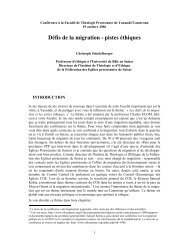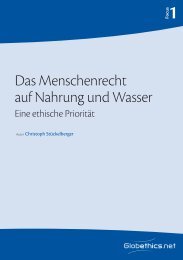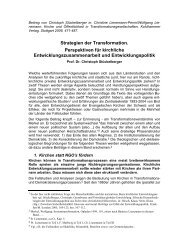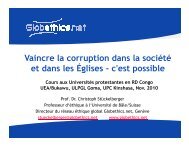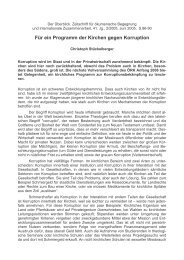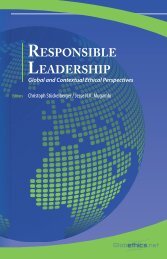BREAK THE CHAINS OF OPPRESION AND THE YOKE OF ...
BREAK THE CHAINS OF OPPRESION AND THE YOKE OF ...
BREAK THE CHAINS OF OPPRESION AND THE YOKE OF ...
Create successful ePaper yourself
Turn your PDF publications into a flip-book with our unique Google optimized e-Paper software.
FuturE UK Government Committee on Climate Change judges that ‘the global danger<br />
zone starts above about 2°C and that global policy should aim to keep … temperature<br />
increases below this’ 25 . However, in making this assessment they note<br />
that ‘it is no longer possible with certainty, or even with high probability, to<br />
avoid this danger zone’ and therefore ‘strategies for adaptation to temperature increases<br />
of at least 2OC’ should be planned, with the additional aim ‘to reduce to<br />
very low levels (e.g. less than 1%) the dangers of exceeding 4°C’ 26 . In light of this<br />
judgement, the Committee on Climate Change concludes that global emissions<br />
of greenhouse gases would have to be reduced by 50% below current emissions<br />
by 2050. Since ‘it is difficult to imagine a global deal which allows the developed<br />
countries to have emissions per capita in 2050 which are significantly above a<br />
sustainable global average’ of ‘between 2.1 and 2.6 tonnes per capita’ for the UK<br />
this implies an ‘80% cut in UK Kyoto (greenhouse gas) emissions from 1990<br />
levels’. 27 Towards this end, they set three five-year carbon budget targets which<br />
would see a reduction in UK emissions of 42% by 2020, 28 achieved through energy<br />
efficiency measures and technological developments to de-carbonise power<br />
generation and transport. 29<br />
24 IPCC, ‘Synthesis Report Summary’, 20, Table SPM.6.<br />
25 UK Government Committee on Climate Change, ‘Building a Low-Carbon Economy<br />
– The UK’s Contribution to Tackling Climate Change’, December 2008 (London:<br />
The Stationery Office, 2008), www.theccc.org.uk/reports/, 20<br />
26 Committee on Climate Change, ‘Building a Low-Carbon Economy’, 20. There is a<br />
growing body of opinion that is concerned that observed changes in climate, such ice<br />
melt within the arctic circle, are progressing faster than the IPCC models predict. This<br />
has led to proposals for stabilization of greenhouse gases at lower concentrations to re-<br />
� � � � �<br />
duce the risk of passing dangerous tipping points in our global eco-system. Two signif-<br />
icant networks are the 350 network, www.350.org, and the 100 months campaign,<br />
www.onehundredmonths.org.<br />
27 Committee on Climate Change, ‘Building a Low-Carbon Economy’, xiv–xv.<br />
28 Following the EU framework, the figure of 42% is the intended budget reduction relative<br />
to 1990 that will apply ‘following a global deal on emissions reductions’. Before<br />
a global deal is reached an ‘Interim budget’ requires a 34% reduction by 2020 (Committee<br />
on Climate Change, ‘Building a Low-Carbon Economy’, xix).<br />
29 Recent documents published by the EU and Australian governments also commend<br />
the global target of a 50% reduction in emissions by 2050. However, in aiming towards<br />
this, they recently adopted less ambitious emission reductions by 2020: the EU<br />
up to 30% and Australia 15%. See European Commission, Combating Climate<br />
Change: The EU Leads The Way (Brussels; European Commission Publication,<br />
2008), ec.europa.eu/publications/booklets/ move/75/index_en.htm) and Australian<br />
Government Department of Climate Change, Carbon Pollution Reduction Scheme:<br />
Australia’s Low Carbon Future (Canberra: Australian Government, 2008), www.climatechange.gov.au>.<br />
Again both these figures refer to ‘intended’ targets following a<br />
global deal on emissions reductions. Prior to this, ‘interim’ targets of 20% for the EU<br />
and 5% for Australia are proposed. For discussion of the viability of a 50% reduction<br />
��������������������������������������������<br />
� � � � ��������������������<br />
�<br />
– HOPE IN GOD’S FUTURE – 163



